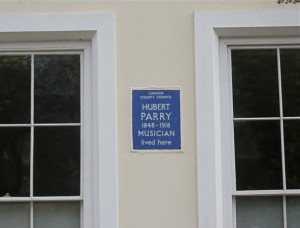This beautiful Queen Anne house @ nr 17 Kensington Square has the largest staircase in the square. Kensington Square, 17, was the home of Hubert Parry. His eldest daughter inherited the house in 1932. She was married to Lord Ponsonby, leader of the Labour opposition in the House of Lords. In 1936 Lord Ponsonby produced a detailed and well-researched history of Kensington Square.
A prolific musician, composer and from 1885 Director of the Royal College of Music, who nursed a whole generation of British composers, Hubert Parry is much forgotten today except for his piece sang by riotous crowds at the last night of the Proms set on Blake’s poem “Jerusalem”. He composed chamber music, oratorios and symphonies.
On a more exotic note he set to music “The Soldier’s Tent” a poem by Carmen Sylva, Queen of Romania and Helene Vacaresco, which at the time of the Boer War was greatly en vogue raising the spirits of the British public at home.
The Soldier’s Tent

The Queen of Romania wrote the poem “The Soldier’s tent” put to music by Sir Herbert Parry – a song popular during the Boer War
Across the mountains the mist hath drawn
A cov’ring of bridal white;
The plains afar make lament, and mourn
That the flutt’ring veil of the mist-wreaths born
Hath hidden the mountains from sight.
The soldier lay smiling peacefully
Asleep in his tent on the sward,
The moon crept in and said: “Look at me,
A glance from thy sweetheart am I, for thee!”
But he answered: “I have my sword.”
Then the rustling wind drew softly near,
Played round him with whispers light:
“I am the sigh of thy mother dear,
The sighs of thy mother am I, dost hear?”
But he answered: “I have the fight.”
Then night sank down from the dark’ning sky
Round the sleeper, and murmured: “Rest,
Thy sweetheart’s veil o’er thy face doth lie!”
But he answered: “No need of it have I,
For the banner doth cover me best.”
By his tent the river, clear and wide,
Rolled onward its silver flood,
And said: “I am water, the cleansing tide
More blessèd than aught in the world beside.”
But he answered: “I have my blood.”
Then Sleep drew near to his tent, and low
She whispered with soothing breath:
“I am Sleep, the healer of ev’ry woe,
The dearest treasure of man below.”
But the soldier replied: “I have Death.”
Across the mountains the mist hath drawn

Herbert Parry encounter with Carmen Sylva and Helene Vacaresco is illustrated in “Blouse Roumaine – the Unsung Voices of Romanian Women”
A cov’ring of bridal white;
The plains afar make lament, and mourn
That the flutt’ring veil of the mist-wreaths born
Hath hidden the mountains from sight.”
(Translation by Alma Strettell and Carmen Sylva,
after Hélène Vacaresco The Bard of the Dimbovitza)
Set to music by Sir C. Hubert H. Parry (1848-1918)



I am looking for Romanian Women poets who wrote during 1914 – 1918. Can you advise me please as to where I can find details of such poets and their poems? Thank you. Kind Regards Lucy
Hubert Parry was Director of the Royal College of Music, not the Royal Academy of Music (Carmen Sylva, Elena Vacarescu and the British Composer Sir Hubert Parry).